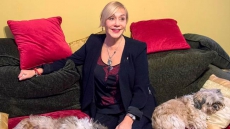TORONTO — Is there one sure-fire strategy to maximize your time and energy in a given day?
Chris Bailey was so determined to find out that he turned down two lucrative job offers and devoted a year of his life to a quest for the holy grail of productivity.
In addition to his research and interviews with leading experts, the business school graduate used himself as the test subject in a series of experiments.
Bailey lived in isolation for 10 days, worked 90-hour weeks and gained 10 pounds of muscle mass.
He documented the experiments on his blog and then compiled the upsides and pitfalls of his pursuits in the book "The Productivity Project" (Random House Canada).
Bailey said there is no one-size-fits-all strategy for increased productivity. He learned that firsthand when the habitually late riser forced himself to wake up at 5:30 a.m. for three months.
"It didn't work for me, and I accomplished less in that experiment than I would have otherwise," Bailey said during a recent interview in Toronto.
"I had to go to bed when I had the most energy, when I was the most productive — because I don't view productivity as how much we produce, I view productivity as how much we accomplish. The best way I found to do that while doing my project was by managing our time, our attention and our energy."
Bailey also tried drinking only water for an entire month and found he had more energy than he had in years.
While he still drinks caffeine and said it can offer productivity benefits, he added that people should be smarter about their consumption habits and not continuously rely on the stimulant.

"Being able to find that energy boost whenever you need it, when you have something important you're working on ... is something huge that you can do."
Bailey writes in his book about the benefits of assessing your Biological Prime Time (BPT) for performing one's highest-impact tasks.
"It's during your peak energy hours that you're able to bring more to whatever it is that you're doing, so that you can spend your energy wisely, in addition to spending your time wisely if you have the flexibility to do so."
A strategy Bailey has maintained is to unplug from digital devices from 8 p.m. to 8 a.m. He also suggested shrinking "support tasks" that can consume considerable time, like answering emails.
"If you check them every hour — even for 12 hours — over the course of the day, that's still 12 times a day and more than enough time to keep on top of everything that you have to do."
Bailey said among the best tactics for him were those that allowed him to work "more deliberately and with intention."
"When we have more work to do than the time to do it in, it becomes crucial that we take that step back to figure out what's important," he said.
"When you only work on auto-pilot in response to whatever tasks get sent your way ... other people have control over your work."
Another of his favoured approaches is "the rule of three"— looking ahead to the end of the day to determine which three things you'd like to accomplish.
"On days where you have a ton of meetings, maybe those meetings are what you intend to accomplish — or maybe they limit what you intend to accomplish.

"Just taking that step back is something huge someone can do for their productivity."




